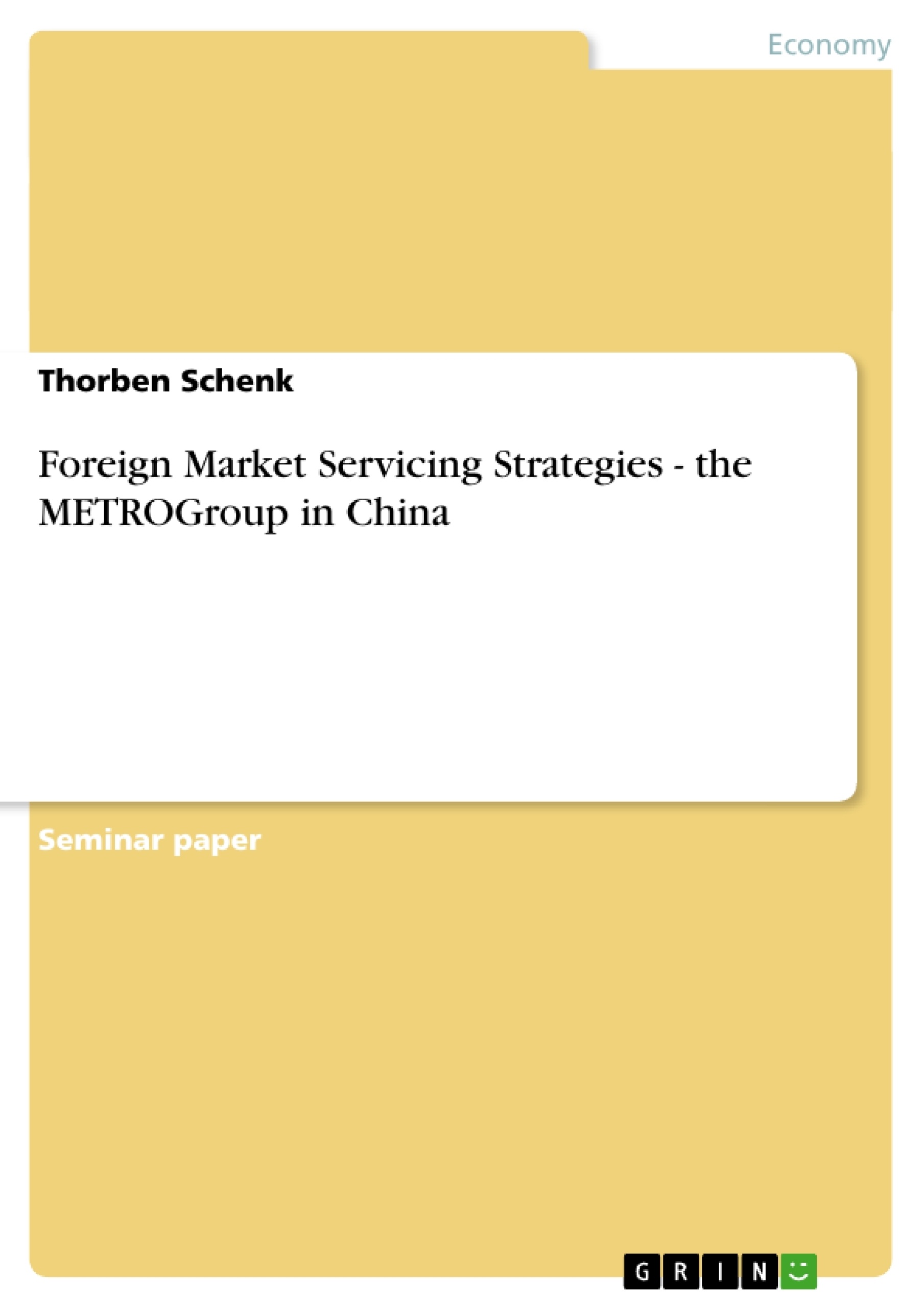Multinational Retailers seek ways of expanding abroad. They search for markets, products to sell, cheap labour or resources. Several foreign markets have been served so far but only recently, China was discovered as future marketplace for foreign retailers.
Like others, the German based METRO Group seeks expansion there. They weigh the pros and cons and finally adopt FDI as their foreign market servicing strategy as it seems to meet their philosophy of doing business abroad best.
Inhaltsverzeichnis (Table of Contents)
- Abstract
- 1 Introduction
- 2 China - The Global Domestic Market
- 2.1 Background Information
- 2.2 The Chinese Retail Market
- 2.2.1 Market Development
- 2.2.2 Market Profile
- 2.2.3 The Rural Retail Market
- 2.2.4 The Retail Style Development
- 2.3 Existing Problems
- 2.4 The Competitors
- 2.4.1 Wal-Mart
- 2.4.2 Carrefour
- 3 METRO Group - The Company
- 4 Modes of Entry
- 4.1 Exporting
- 4.2 Licensing/ Franchising
- 4.3 Foreign Direct Investment (FDI)
- 4.3.1 Foreign Founded Enterprises
- 4.3.2 Processing and Assembly Agreements
- 4.3.3 Compensation Trade
- 4.3.4 Joint Ventures
- 4.3.4.1 Equity Joint Ventures
- 4.3.4.2 Contractual Joint Ventures
- Recommendation for a Foreign Market Servicing Strategy
- Summary
- Bibliography
- Appendix
Zielsetzung und Themenschwerpunkte (Objectives and Key Themes)
This report examines foreign market servicing strategies (FMSS) and applies them to the METRO Group, a leading German retailer. It investigates the advantages and disadvantages of expanding into the Chinese market, aiming to identify the optimal strategy for METRO Group to expand its product offerings and market presence.
- The growing potential of the Chinese market for foreign retailers
- The challenges and opportunities posed by the Chinese economic and political environment
- The different modes of market entry available to foreign companies, such as exporting, licensing, franchising, and foreign direct investment (FDI)
- The strengths and weaknesses of various FMSS options for the METRO Group
- Recommendations for the optimal FMSS strategy for METRO Group to successfully enter and operate in the Chinese market
Zusammenfassung der Kapitel (Chapter Summaries)
The report begins by providing an overview of the Chinese economy and retail market. It delves into the historical context of China's transition from a closed economy to a more open market, highlighting the impact of reforms on the domestic economy. The report examines the growth and development of the retail sector, including both urban and rural markets.
Following this, the report explores key challenges facing foreign companies operating in China, including competition from local and international players. It analyzes the strategies of major competitors like Wal-Mart and Carrefour, offering insights into their approach to the Chinese market.
Chapter 3 introduces the METRO Group, providing a comprehensive profile of the company and its operations. The report then dives into various modes of market entry for foreign companies, analyzing the advantages and disadvantages of each option, including exporting, licensing, franchising, and foreign direct investment (FDI).
Schlüsselwörter (Keywords)
The primary keywords and focus topics include foreign market servicing strategies, the Chinese retail market, foreign direct investment, METRO Group, and the challenges and opportunities associated with entering the Chinese market. The report explores the intricacies of navigating the complexities of the Chinese economic and political landscape while examining the potential for successful expansion for foreign retailers.
Frequently Asked Questions
Why did METRO Group choose FDI for the Chinese market?
METRO Group adopted Foreign Direct Investment (FDI) because it best aligns with their business philosophy of having direct control and presence in foreign markets.
What are the main entry modes for foreign retailers in China?
The report discusses several modes: exporting, licensing/franchising, and various forms of FDI like Joint Ventures (Equity or Contractual) and Foreign Founded Enterprises.
Who are METRO Group's biggest competitors in China?
The report identifies major global retailers like Wal-Mart and Carrefour as the primary competitors in the Chinese retail landscape.
What makes the Chinese retail market unique?
China is described as a 'Global Domestic Market' with a rapid transition from a closed economy, a growing rural retail market, and unique retail style developments.
What challenges do foreign companies face in China?
Challenges include navigating the complex political and economic environment, competing with established local players, and adapting to diverse consumer needs in urban and rural areas.
- Citar trabajo
- Thorben Schenk (Autor), 2004, Foreign Market Servicing Strategies - the METROGroup in China, Múnich, GRIN Verlag, https://www.grin.com/document/28470



